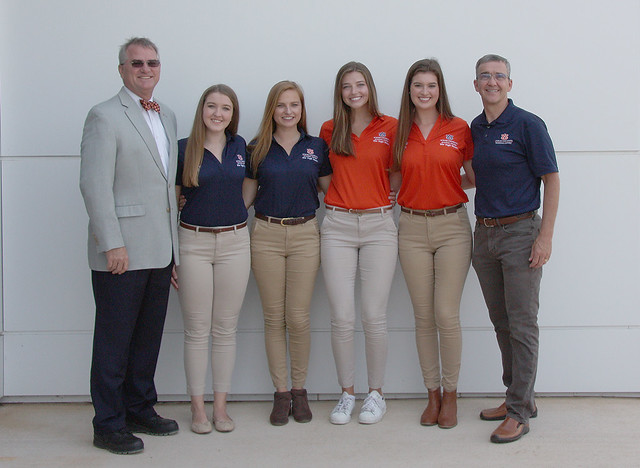Auburn women’s team places second at Air Race Classic
Article body
After four days of flying in the 43rd annual Air Race Classic, the Auburn University eagles have landed. The War Eagle Women—Orange team placed second in the overall competition and took first place in the collegiate division. There were 50 competitors overall with 14 college teams.
The two pilots for the War Eagle Women—Orange team were Kendall Higdon and Caitlyn Miller.
“When they announced that we were second overall, I think we both received our awards with tears in our eyes,” Higdon said.
“We were in total disbelief when our name was called,” said Miller. “To have all of the hard work and months of preparation pay off in such a big way was overwhelming.”
The duo also won the award for the “Fastest Cessna.” Both Auburn teams were flying the Cessna Skyhawk 172S, Nav III. The War Eagle Women—Blue team, piloted by Sierra Hardwick and Mattie McKenna, also represented Auburn, taking 15th place overall and sixth in the collegiate division.
“I am unbelievably proud of both teams for their determination to finish the race,” said Joseph Aistrup, dean of the College of Liberal Arts. “There were some weather challenges that would have given them an out in competing, but their fortitude prevailed and both teams did extremely well.”
The Air Race Classic is the epicenter of women's air racing. Pilots range in age from 17 to 90 years old. They come from a wide variety of backgrounds including students, teachers, doctors, airline pilots, business owners, professionals and air traffic controllers. Race teams, consisting of at least two women pilots, must fly VFR, or Visual Flight Rules, during daylight hours only and are given four days to make flybys at each en route timing point and then land at the terminus.
“This race is a competition but it’s so much more than that. It’s about the experience you attain, the friendships you make and it truly exemplifies women supporting women,” Higdon said.
The race route changes each year, approximately 2,400 statute miles in length, with eight or nine timing points. Due to weather, a couple legs of the race were canceled this year, including the first scheduled stop in LaGrange, Georgia.
“One of the attributes of being a pilot is being flexible and so having those legs cancelled truly put our skills to work and tested our flexibility and teamwork skills,” Higdon said.
The university was able to fund a second team to participate in this year’s race thanks to the 163 donors who participated in Tiger Giving Day. The funds cover supply fuel, flight costs, food, lodging and training.
“We had incredible support from the Auburn Family throughout and we are proud to bring home this win,” Miller said. “We have been beaming ever since.”
Related Media
Media interested in this story can contact Communications Director Preston Sparks at (334) 844-9999 or preston.sparks@auburn.edu.
Auburn University is a nationally ranked land grant institution recognized for its commitment to world-class scholarship, interdisciplinary research with an elite, top-tier Carnegie R1 classification, life-changing outreach with Carnegie’s Community Engagement designation and an undergraduate education experience second to none. Auburn is home to more than 30,000 students, and its faculty and research partners collaborate to develop and deliver meaningful scholarship, science and technology-based advancements that meet pressing regional, national and global needs. Auburn’s commitment to active student engagement, professional success and public/private partnership drives a growing reputation for outreach and extension that delivers broad economic, health and societal impact.







